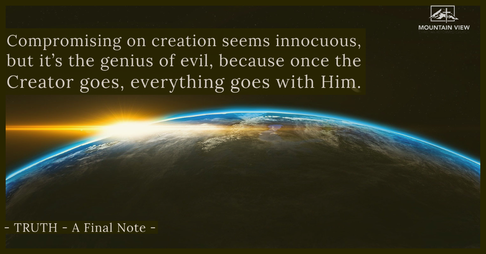 I’ve written now a few times about truth, but I just have a few more thoughts on how it’s impacting our world. In that way, it’s hard to argue for a certain passage of Scripture being more important than another, because it’s all God’s Word, testifying to us of Jesus. However, the first chapter in the Bible provides the undergirding for everything we believe and everything which society needs to properly function. Clearly, it’s not all spelled out in detail there, but what I mean is this: when a Creator is lost, everything is lost. Without a Creator God establishing and maintaining a created order, there is no basis for morality, no basis for laws, rules, relationships, purpose, or anything else. Nothing could be more dangerous than to do away with the concept of creation. Yet for centuries now the whole idea of creation is scoffed at. It’s been replaced with the old Gnostic ideas of the material as bad and the spiritual as good, or it’s been mocked at by those who believe in the evolution arising from a primordial ooze. I know there are some wonderful Christian teachers and believers who hold to some form of creation-based-evolution, but that’s not the point. The point is to say that if we remove creation altogether, if we remove God altogether, then we lose everything. If there is no set of governing laws in this universe as given by a Creator, then we are simply moral-less beings. What, then, is the objective standard by which anything is judged? Why is there a US Constitution? Why police? Why churches? Why respect in the societal sphere? Why stop signs and red lights and borders and the like? What objective metric is used for scientific conclusions? Why does life have value? By trying to remove God, society itself is undermined, and this is what is actively taught and promoted in our schools and from our government. Everything listed above has been openly attacked in the last year, because many in power have drunk so much of it that they’ve lost sight of their fallen mortality. Compromising on creation seems innocuous, but it’s the genius of evil, because once the Creator goes, everything goes with Him. So much more could and should be said about this, but if we want to see any change in this world, we Christians need to get back to the basics of our faith, to learn them well and defend them fiercely. They’ll call us bigots for doing it, but that simply betrays their own argument, because we can only be bigots if there’s an objective standard of truth. And if there’s an objective standard of truth, there’s a Creator God behind it.
1 Comment
 With our final blog on truth, we want to look at how it manifests itself in this world. That is, is truth a Bible-thumping Christian that must always have a quick comeback for everything and consistently accost people in the store by saying, “You think a sale on milk is good? You know what’s even better? – Jesus”? Or, is it being a citizen that believes “#loveislove” and that love is, at its core, acceptance? As we answer that, let’s once again reassert the undeniable: there is objective truth, and that objective truth is revealed in Scripture. What Scripture then tells us in Isaiah 5:20 is this: “Woe to those who call evil good and good evil, who put darkness for light and light for darkness, who put bitter for sweet and sweet for bitter!”. Put simply: we must get our truth right, or there is God’s own “woe” of fury upon us. We then get that truth right by humbly submitting to God’s written Word and, as it bears witness beyond itself, to God’s living Word – His Son, Jesus. So how do we go forward as Christians in a post-modern world? How do we as believers handle questions of homosexuality, transgenderism, and all the policy-driving questions of today? The Bible tells us that we must “speak the truth” – that is, we can never shy away from it; if the Bible says it, we must affirm it. But this truth must be spoken “in love” (Ephesians 4:15). Vital to this conversation, then, is a definition of love, because too often we hear fellow believers embrace anti-biblical ideas along the lines of, “a loving God wouldn’t do such and such”. But truth in its very nature divides. It draws a line of yes or no, reality or unreality, what is and what is not. A sovereign God will certainly do things we don’t like, which is why we need to seek His revealed will in His Word. But it’s also necessary to remember, then, that the Bible tells us that “God is love” (1 John 4:8). So how is love defined? 1 Corinthians 13 defines it in what seems today to be a radical way. Just see how counter-cultural it is. “4 Love is patient and kind; love does not envy or boast; it is not arrogant 5 or rude. It does not insist on its own way; it is not irritable or resentful; 6 it does not rejoice at wrongdoing but rejoices with the truth. 7 Love bears all things, believes all things, hopes all things, endures all things” (1 Corinthians 13:4-7). Now, this passage exists in ubiquity. It’s at weddings, slapped on decorations, and even quoted often enough on television. But this leads to a lack of a careful reading. Notice again how love is defined here: love “does not rejoice at wrongdoing but rejoices in the truth”. What this means is that in world of acceptance, true love has at its core an intolerance. That is, an intolerance for all distortions of love. According to Scripture, we cannot actually love someone if we promote anything less than truth. So, what are some perversions of love? |
AuthorMy name is Bryan Lanting. I am a graduate of Reformed Theological Seminary, and I am presently serving Mt View CRC as their pastor. I am married to a wonderful wife named Sydney, and both of us are loving life, loving Lynden, and loving the Lord! Archives
October 2021
Categories |

 RSS Feed
RSS Feed